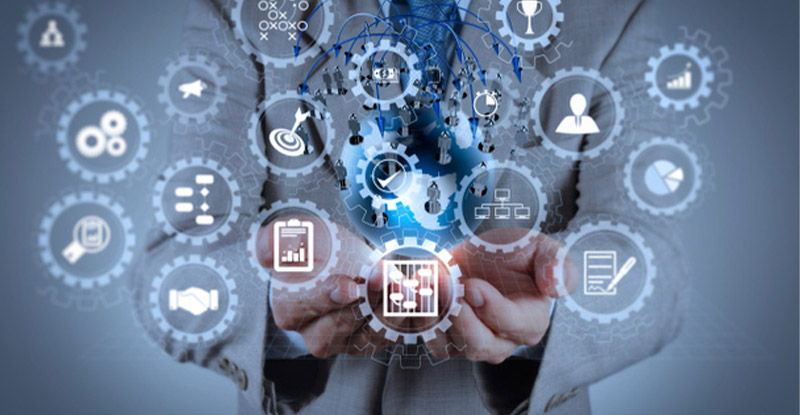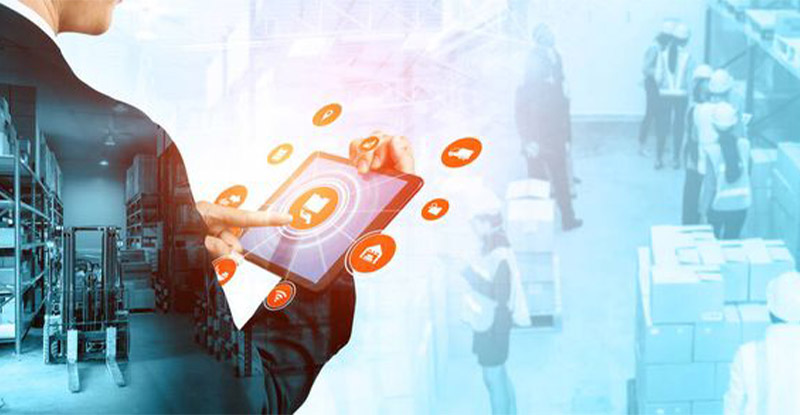CRM vs. ERP: What's the Difference?
When comparing ERP vs. CRM, discover which features make the most business sense.

When comparing ERP vs. CRM, discover which features make the most business sense.

In the business world, Customer Relationship Management (CRM) and Enterprise Resource Planning (ERP) are two systems many companies rely on to organize their operations better. But what are the key differences between these two software systems? Let’s dive in and break down how each system works and why each serves a unique purpose.

Let docAlpha do your business data and documents entry directly to CRM and ERP, liberating your time for creative tasks.
Both CRM and ERP software are essential for running a successful business today, but they serve very different purposes. The former helps manage customer relationships, while the latter focuses on optimizing internal operations within an organization.
While there are certainly overlaps between the two—such as being able to access customer data in both systems—it’s essential to know which system should be used when to maximize efficiency and ensure that your business is running smoothly at all times.
In an ever-changing digital world, understanding the differences between Enterprise Resource Planning (ERP) and Customer Relationship Management (CRM) is key to business success. ERP and CRM have similar functions in that they are both ways to organize data and optimize the customer experience. However, they differ in how the data is presented and how it should be used.
ERP focuses on optimizing operations from within, streamlining day-to-day tasks like inventory management and order processing. Further, it allows for easy access to financial information.
On the other hand, CRM emphasizes strengthening customer relationships by providing comprehensive customer databases and analyzing buying trends.
Both systems have their own strengths, so a successful business should strive to fully understand ERP and CRM and use them together to provide customers with an excellent experience.
Maximize your business potential with a seamless data connection to your CRM and ERP with intelligent document automation. Get started with docAlpha!
Book a demo now
Enterprise Resource Planning (ERP) and Customer Relationship Management (CRM) are two technologies that, while similar in some aspects, provide very different functionalities. ERP systems are designed to manage critical aspects of business, such as:
It is a unified system that allows businesses to keep track of what is happening across departments in real time.
On the other hand, CRM mainly focuses on managing customer relationships. It can be used for:
While each system serves its own purpose independently from the other, ERP and CRM can work together to create an integrated experience for businesses and their customers.
By combining ERP and CRM technologies, organizations have access to comprehensive datasets which enable them to gain insight into customer behavior and identify key trends in the customer journey process.
Customer Relationship Management (CRM) software helps businesses better manage their customer relationships, sales, marketing, customer service, and analytics. It stores all of your customer data in one centralized location so your team members can easily access it.

This way, everyone always has up-to-date information about who to contact, what promotions to run, how much customers spend, etc. CRM also keeps track of sales leads across different stages to help you close more deals.
Additionally, CRM automates specific tasks, such as creating invoices or follow-up emails, so your team can focus on building customer relationships instead of worrying about mundane administrative tasks.
Customer Relationship Management (CRM) combines strategies, processes, and technologies designed to help businesses better manage customer interactions.
Through innovative CRM technology and data analysis, organizations can gain insight into customer behaviors and preferences that can be used to create personalized experiences.
With CRM, businesses are truly empowered to identify opportunities for success by having access to key information about customers, such as purchase history and contact information.
CRM is about creating stronger bonds between companies and their customers, resulting in increased loyalty, higher sales, and client satisfaction.
CRM stands for Customer Relationship Management. This system is designed to help businesses better understand their customers and keep track of their interactions. This helps them gain insight into what their customers want or need, as well as identify potential opportunities to increase customer engagement and loyalty.
CRM enables businesses to respond quickly and efficiently to customer inquiries, helping them build trust in their products and services.
By leveraging CRM technology, organizations can improve communication with their customers and create a more personalized customer experience — ultimately leading to increased customer satisfaction and higher sales.
There are many different Customer Relationship Management (CRM) software options available, including:
These are just a few examples of the many CRM software options available. The specific features and pricing can vary significantly between different options, so it's essential to do your research and choose the one that best meets your business's needs.
Unlock the power of your business data with smart connectivity. Bring your documents seamlessly into CRM and ERP with docAlpha!
Book a demo now
Customer Relationship Management, or CRM, is an integral part of any successful business. It’s a system that stores customer information, tracks customer interactions, and monitors sales performance. But what are the main functions of CRM? Let’s explore what it can do for your business.
CRM systems store all customer data in one centralized location. This data includes contact information, sales notes, purchase history, and marketing preferences. The organization of this data makes it easier to access when needed. Additionally, the data can be easily shared among different departments in a company, allowing for better collaboration between teams.
CRMs also provide insight into customer behavior through analytics and reports. Through these tools, you can gain valuable insight into how customers interact with your business—what they purchase most often, how long they take to make decisions before buying something from you, etc.—and use this knowledge to inform your marketing and sales strategies.
Additionally, you can use reporting to track KPIs such as the revenue generated from each customer segment or average sale size over time.
The best CRM will allow for the automation of repetitive tasks like sending emails or follow-up calls after a purchase is made. Automation saves time for the staff involved so that they can focus on higher-value tasks that require more thought and effort on their part.
Also, many CRMs will offer some degree of customization so that the software fits perfectly with the needs of your specific company or industry.
Ultimately, when used correctly, a CRM system can save time while providing valuable insights into customer behavior which will help inform your strategies and improve efficiency across all departments within your organization.
As technology continues to evolve, so too do the capabilities offered by CRMs. So if you're looking for ways to increase productivity within your business, then investing in a good CRM might be worth considering!
On the other hand, Enterprise Resource Planning (ERP) software is designed for managing internal operations within an organization. This includes inventory management, accounting/payroll processes, supply chain management, human resource management, project management/collaboration tools, and more.

ERP makes it easier for businesses to streamline operations by providing transparency in data from every department within the organization. It also helps automate various processes and makes it easier to track performance metrics such as corporate finances or employee productivity.
Enterprise Resource Planning (ERP) is an integrated business management system that provides the platform to:
ERP offers visibility into the end-to-end supply chain of an organization, allowing for improved communication among departments and greater control over data and processes.
ERP also enhances decision-making capabilities by providing real-time analysis of various aspects of a business, such as inventory levels and customer satisfaction, through configurable reports and dashboards. This information can then be leveraged to make evidence-based decisions that can lead to cost savings and increased profitability.
ERP means Enterprise Resource planning. This integrated software suite helps businesses manage their operations more efficiently across various departments. Let’s take a look at what ERP is and how it can help your business.
At its most basic, ERP provides centralized access to data from all the different areas in a company. This data includes everything from customer information and financial records to inventory tracking and employee data.
All this information comes together in one place, allowing businesses to see the “bigger picture” when it comes to their operations. As such, ERP makes it easier for companies to make informed decisions about their business processes.
Streamline your operational processes! Let docAlpha automatically enter your business documents and data to CRM and ERP.
Book a demo now
Using ERP allows businesses to streamline their operations by automating manual processes and eliminating unnecessary steps. This reduces costs while improving efficiency, accuracy, and productivity across the board.
Additionally, since the system integrates with existing software, there’s no need for expensive or time-consuming re-implementations—saving you time and money in the long run. Finally, because all data is stored in one place, everyone in the organization has access to real-time information—allowing them to make better decisions more quickly than ever before.
In summary, Enterprise Resource Planning (ERP) provides businesses with an efficient way of managing their operation across various departments by collecting all relevant data into a centralized location.
By using ERP software, organizations can reduce costs, and improve accuracy and productivity levels—all while having immediate access to real-time information that helps them make better decisions more quickly than ever before.
If you’re looking for a way to take your business operations up a notch or two—ERP might be just what you need!
Enterprise Resource Planning (ERP) software is business management software that helps companies manage their business operations and automate various processes. Here are some examples of popular ERP software:
SAP ERP is one of the most widely used ERP systems worldwide, with a suite of integrated modules that cover various business processes, including finance, sales, procurement, inventory management, and production planning.
Oracle ERP Cloud is a cloud-based ERP system that provides a comprehensive suite of modules that can be customized to meet the specific needs of businesses.
Microsoft Dynamics 365 is an integrated cloud-based ERP system that offers modules for finance, operations, sales, marketing, and customer service.
Infor ERP is a cloud-based ERP system that offers a range of modules for managing different business processes, including financial management, human capital management, supply chain management, and customer relationship management.
NetSuite ERP is a cloud-based ERP system that provides a complete suite of modules for managing various business operations, including financial management, inventory management, order management, and procurement.
Sage X3 is a cloud-based ERP system that provides a range of modules for managing different business processes, including finance, supply chain, production management, and customer service.
Epicor ERP is a comprehensive ERP system that offers modules for managing various business processes, including financial, inventory, supply chain, and customer relationship management.
Acumatica ERP is a cloud-based ERP system that provides a range of modules for managing various business processes, including financial management, inventory management, and project management.
The main functions of an ERP system are to integrate and automate core business processes across an organization. Here are some of the main functions of ERP:

Financial management: ERP systems provide a range of financial management functions, including accounts payable and receivable, general ledger, cash management, and financial reporting.
Supply chain management: ERP systems can help businesses manage their supply chain processes, including procurement, inventory management, demand forecasting, and production planning.
Human resources management: ERP systems provide functions for managing employee information, such as payroll, benefits administration, and performance management.
Customer relationship management: ERP systems can help businesses manage their customer relationships, including customer data capture and management, sales and marketing automation, and customer service and support.
Production management: ERP systems can help businesses manage their production processes, including scheduling, capacity planning, and quality control.
Project management: ERP systems can help businesses manage their project workflows, including project planning, resource allocation, and project tracking.
Business intelligence: ERP systems can provide business intelligence and reporting functionality, including data analytics, dashboards, and performance metrics.
Overall, an ERP system serves as a central repository of business data and provides a single source of truth for the entire organization. By automating and integrating business processes, an ERP system can help businesses increase efficiency, reduce costs, and improve decision-making.
For many businesses, Enterprise Resource Planning (ERP) software and Customer Relationship Management (CRM) software are two of the most important tools they have at their disposal. However, while these two systems share a lot in common—they both help businesses increase efficiency by automating specific tasks—there are also some essential differences that IT professionals and business owners should be aware of. Let's take a closer look at what sets ERP and CRM apart.
The focus is the key difference between ERP and CRM systems. ERPs help businesses manage production and business processes. Essentially, ERP systems are designed to help businesses automate complex processes like supply-chain management, financial planning, HR administration, inventory control, and more. By consolidating all these processes in one place, ERP systems make it easier for businesses to keep track of their operations without manually updating multiple databases or spreadsheets.
On the other hand, CRM systems are designed to help businesses manage customer relationships. This includes everything from tracking customer interactions to managing sales leads and automating marketing campaigns. Unlike ERP systems that track internal data points like inventory levels or employee hours, CRM systems are designed specifically for customer relations management—hence the name.
In addition to helping businesses better understand their customers' needs and preferences, CRM systems also make it easier for companies to target specific audiences with custom marketing campaigns or special offers tailored specifically to them.
While there are some similarities between ERP and CRM software—such as automation capabilities—each system serves a unique purpose when it comes to managing business operations.
ERP, or Enterprise Resource Planning, and CRM, or Customer Relationship Management, are two different business management solutions that are frequently used together.
Both systems can help businesses run more efficiently by automating processes and providing insights into customer data. However, it is important to understand how each system works and the unique functions they bring to the table. Let’s take a look at the differences between ERP and CRM functions.
ERP is an enterprise-wide information system that integrates all departments within a company. It helps organizations manage their operations by providing an integrated view of all data related to finance, HR, inventory management, customer service, marketing automation, etc.
This enables managers to have a better understanding of their company's performance in order to make more informed decisions.
Additionally, ERP can help streamline processes such as accounting and payroll while improving communication between departments by eliminating manual processes.
CRM platform is designed specifically to manage customer relationships by providing an integrated view of customer data across multiple channels (phone calls, emails, web forms). This allows companies to gain valuable insights into their customers to better serve them with personalized offers and services.
Additionally, CRM systems provide tools for marketing automation that allow companies to track leads from various sources (social media platforms), segment prospects based on criteria such as location or interests, and target those prospects with tailored campaigns to increase engagement with the brand.
Finally, the best CRM system also provides reporting features that enable businesses to analyze customer behavior and develop strategies for optimizing their sales process based on this data-driven approach.
Understanding both ERP and CRM functions is key for a business owner or entrepreneur to maximize organizational efficiency. By utilizing these two systems together, you can gain valuable insights into your customer base while streamlining your operations through automated processes.
Enterprise Resource Planning (ERP) is a software system that integrates all aspects of a business's operations, including finance, human resources, supply chain management, manufacturing, and customer relationship management. The level of integration in an ERP system refers to how closely these different areas are interconnected.
There are typically three levels of integration in an ERP system:
Data integration: This is the lowest level of integration and involves sharing data between different departments. For example, the finance department might share financial data with the manufacturing department to help with production planning.
Process integration: This involves integrating business processes between departments. For example, the sales department might use customer data from the marketing department to generate leads and close sales.
Full integration: This is the highest level of integration and involves fully integrating all aspects of a business's operations. For example, a customer order might automatically trigger a process that initiates production, schedules delivery, and updates the customer relationship management system.
The level of integration in an ERP system can significantly impact a business's efficiency and effectiveness. A fully integrated ERP system can help eliminate data silos, streamline processes, and improve communication between departments, resulting in better decision-making and increased profitability.
Customer Relationship Management (CRM) is a software system that manages a company's interactions with its customers, including customer data, sales, marketing, and customer service. The level of integration in a CRM system refers to how closely these different areas are interconnected.
Similar to ERP, there are typically three levels of integration in a CRM system:
Data integration: This is the lowest level of integration and involves sharing customer data between different departments. For example, the sales department might share customer data with the marketing department to help with targeted marketing campaigns.
Process integration involves integrating business processes between departments to create a seamless customer experience. For example, a customer service representative might use customer data from the sales department to provide personalized support.
Full integration involves fully integrating all aspects of a business's customer interactions. For example, a customer might receive targeted marketing messages based on their purchase history, have their orders processed seamlessly, and receive personalized customer service.
The level of integration in a CRM system can significantly impact a business's ability to provide excellent customer service and increase customer loyalty. A fully integrated CRM system can help eliminate data silos, streamline processes, and improve communication between departments, resulting in better customer experiences and increased profitability.
ERP (Enterprise Resource Planning) and CRM (Customer Relationship Management) are two types of software businesses use to improve their operations and customer interactions. Here are some advantages and disadvantages of each:

Improved efficiency: ERP systems integrate various business processes such as accounting, human resources, inventory management, and supply chain management, improving efficiency and productivity.
Better decision-making: ERP systems provide real-time data on all business processes, enabling managers to make informed decisions based on accurate information.
Cost savings: By streamlining processes and reducing duplication, ERP systems can lead to cost savings in the long run.
Scalability: ERP systems are designed to be scalable, meaning they can grow and adapt as the business expands.
Implementation costs: The cost of implementing an ERP system can be high, with the need for extensive customization and training.
Complexity: ERP systems can be complex, requiring skilled personnel to maintain and operate them.
Resistance to change: Implementing an ERP system can disrupt established business processes, and employees may resist change, leading to resistance and low adoption.
Improved customer relationships: CRM systems enable businesses to track and analyze customer interactions, providing insights into customer needs and preferences, leading to improved customer relationships.
Better sales management: CRM systems enable sales teams to manage leads and track sales activity, improving their efficiency and effectiveness.
Increased revenue: By providing insights into customer needs and preferences, CRM systems can increase sales and revenue.
Marketing automation: CRM systems can automate marketing campaigns, reducing the workload on marketing teams and improving their effectiveness.
Implementation costs: The cost of implementing a CRM system can be high, particularly for businesses that require customization or integration with existing systems.
Data quality: CRM systems rely on accurate data; if data is not entered correctly, the system's effectiveness can be compromised.
Resistance to change: As with ERP systems, employees may resist change when implementing a CRM system, leading to low adoption rates and limited effectiveness.
ERP (Enterprise Resource Planning) and CRM (Customer Relationship Management) are both software systems used to manage different aspects of a business. ERP systems are designed to manage and integrate various business processes, including finance, accounting, human resources, procurement, and inventory management. On the other hand, CRM systems are designed to manage customer interactions and relationships.

The main differences between ERP and CRM systems are the scope of their functionality and the data they manage. ERP systems are typically used to manage internal business operations, such as production, logistics, and financial management. They provide a single source of truth for data across the entire organization, enabling different departments to share information and collaborate more effectively.
In contrast, CRM systems are designed to manage external interactions, such as sales, marketing, and customer service. They focus on managing customer data, such as contact information, purchase history, and preferences, to help businesses build stronger relationships with their customers.
Therefore, the choice between ERP and CRM systems will depend on the business's specific needs. For example, a manufacturing company may need an ERP system to manage production processes, while a retail business may need a CRM system to manage customer relationships and sales. However, many businesses use both ERP and CRM systems to manage internal and external operations effectively.
Using ERP and CRM together can be a powerful combination for businesses that want to streamline their operations, improve efficiency, and enhance customer relationships. Here are some of the key reasons why it makes good business sense to use ERP and CRM together:
By using ERP and CRM together, businesses can seamlessly integrate their internal operations with external customer interactions. This integration allows businesses to access and share data across different departments, enabling them to provide a more personalized and efficient customer experience.
ERP systems provide businesses complete visibility into their operations, including production, inventory, and financials. By integrating this data with customer information from CRM systems, businesses can comprehensively view their entire business, including customer needs, preferences, and buying behaviors.
Integrating ERP and CRM systems can improve efficiency by reducing duplication of effort, automating routine tasks, and streamlining processes. This efficiency can result in cost savings, increased productivity, and improved customer satisfaction.
Businesses can make better-informed decisions by having access to complete and accurate data from both ERP and CRM systems. This data can provide insights into customer behavior, market trends, and operational performance, enabling businesses to identify opportunities for growth and improvement.
ERP and CRM systems are scalable, meaning they can grow and evolve with the business. By using these systems together, businesses can adapt to changing market conditions, customer needs, and internal operations, ensuring long-term success.
Get ahead of the curve with advanced data capture and process automation capabilities delivered by docAlpha’s intelligent document automation.
Book a demo now
Overall, using ERP and CRM systems together can provide businesses with a competitive advantage by improving efficiency, enhancing customer relationships, and enabling better decision-making.